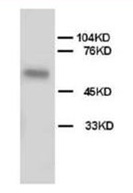Alkaline Phosphatase (ALPL) (N-term) Rabbit Polyclonal Antibody
CAT#: AP23298PU-N
Alkaline Phosphatase (ALPL) (N-term) rabbit polyclonal antibody, Aff - Purified
Other products for "ALPL"
Specifications
| Product Data | |
| Applications | IHC, WB |
| Recommended Dilution | Western blot: At 1-2μg/ml with the appropriate system to detect ALPL in cells and tissues. The detection limit for ALPL is approximately 2.5 ng/lane under non-reducing and reducing conditions. Immunohistochemistry on Paraffin Sections: At 1-2 μg/ml to detect ALPL in formalin fixed and paraffin embedded tissues. Antigen Retrieval by Heat is required. |
| Reactivities | Human, Mouse, Rat |
| Host | Rabbit |
| Isotype | IgG |
| Clonality | Polyclonal |
| Immunogen | Synthetic peptide corresponding to a sequence at the N-terminal of Human ALPL (21-35) |
| Specificity | This antibody detects Alkaline phosphatase / ALPL at N-term. No cross reactivity with other proteins. |
| Formulation | 5mg BSA, 0.9mg NaCl, 0.2mg Na2HPO4, 0.05mg Thimerosal and 0.05mg Sodium Azide State: Aff - Purified State: Lyophilized purified Ig fraction |
| Reconstitution Method | 0.2 ml of distilled water will yield a concentration of 500 μg/ml. |
| Purification | Immunoaffinity Chromatography |
| Storage | Store the antibody undiluted at 2-8°C for one month or (in aliquots) at -20°C for longer. Avoid repeated freezing and thawing. |
| Stability | Shelf life: one year from despatch. |
| Gene Name | Homo sapiens alkaline phosphatase, liver/bone/kidney (ALPL), transcript variant 1 |
| Database Link | |
| Background | Alkaline phosphatase (ALPL) removes phosphate groups from the 5' end of DNA and RNA, and from proteins, at high pH. Most mammals have 4 different isozymes: placental, placental like, intestinal and non tissue specific (found in liver, kidney and bone). Tissues with particularly high concentrations of ALP include the liver, bile ducts, placenta, and bone. ALPL is the alkaline phosphatase of skin fibroblasts, the tissue-nonspecific type, and that it is active toward millimolar concentrations of the putative natural substrates phosphoethanolamine (PEA) and pyridoxal-5-prime-phosphate (PLP). ALPL gene exists in single copy in the haploid genome and is composed of 12 exons distributed over more than 50 kb.Damaged or diseased tissue releases enzymes into the blood, so serum ALP measurements can be abnormal in many conditions, including bone disease and liver disease. |
| Synonyms | AP-TNAP, TNSALP |
| Reference Data | |
| Protein Families | Druggable Genome |
| Protein Pathways | Folate biosynthesis, Metabolic pathways |
Documents
| Product Manuals |
| FAQs |
{0} Product Review(s)
0 Product Review(s)
Submit review
Be the first one to submit a review
Product Citations
*Delivery time may vary from web posted schedule. Occasional delays may occur due to unforeseen
complexities in the preparation of your product. International customers may expect an additional 1-2 weeks
in shipping.






























































































































































































































































 Germany
Germany
 Japan
Japan
 United Kingdom
United Kingdom
 China
China




